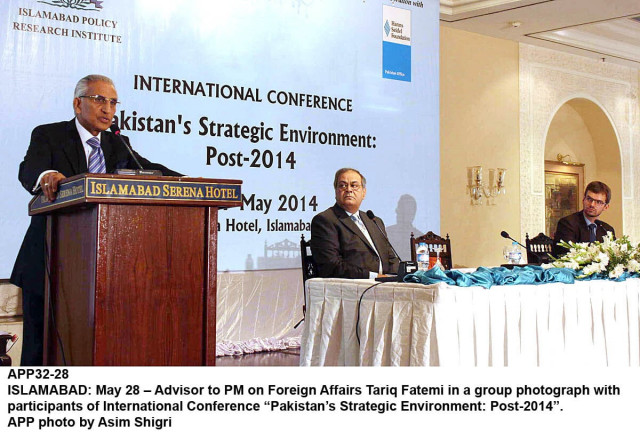Post-drawdown environment: Pakistan committed to cooperative ties with India: Fatemi
Speakers stress the need for trade links, cooperation in South, Central Asia.

Prime Minister Nawaz Sharif’s Special Assistant on Foreign Affairs Tariq Fatemi in his keynote address at the opening session said the premier was committed to building cooperative ties with India. PHOTO: APP
A broad-based reconciliation in Kabul and trade links in South and Central Asia especially cooperation between Pakistan and India are crucial for improving the region’s strategic environment after the troop withdrawal from Afghanistan, speakers said on Wednesday.
They were speaking at an international conference on “Pakistan’s Strategic Environment Post-2014” organised by the Islamabad Policy Research Institute (IPRI) in collaboration with Hanns Seidel Foundation, a German organisation at a local hotel.
Prime Minister Nawaz Sharif’s Special Assistant on Foreign Affairs Tariq Fatemi in his keynote address at the opening session said the premier was committed to building cooperative ties with India.
“In our interaction with the Indian leadership since June 2013, we have consistently emphasised the importance of working together to address common challenges, build sustainable peace, and promote the idea of shared prosperity,” he explained.

Fatemi said in his telephonic conversation with Prime Minister Narendra Modi to greet him on his victory he had emphasized that the main dynamic in South Asia should be cooperation, not confrontation. That is why he responded positively to Modi’s invitation and participated in his swearing in ceremony in New Delhi on May 26.
The two sides agreed that the foreign secretaries would meet soon “to review and carry forward the bilateral agenda.”
Fatemi said the premier emphasised that “We are ready to pick up the thread where it was interrupted in October 1999. We also remain committed to moving towards normalising the trade ties through a deliberate and well-considered process that ensures mutual benefits.”
About Afghanistan, Fatemi said Pakistan had supported the peaceful democratic transition in the country and contributed to the efforts for a free and fair elections including through enhanced security along the border.
He said that Pakistan had affirmed that it would work with whoever would be the democratic choice of the Afghan people.

About relations with China, Fatemi said their ties had transformed into “A comprehensive strategic relationship” and the two countries had achieved a broad consensus on major infrastructure and energy projects including the economic corridor that will be a ‘game changer’.
Fatemi described the US as an “important part of our strategic environment and a key element in Pakistan’s foreign policy considerations.”
Though marked by periods of engagement and estrangement over the years, since June 2013, the relations have continued to improve through interactions and revival of the strategic dialogue.
Discussing relations with Iran which “plays a pivotal part in our vision” of regional peace and progress, he mentioned the prime minister’s visit to Tehran where he had wide ranging consultations with a view to deepening and institutionalising mutually beneficial cooperation in diverse fields.
Pakistan’s relations with the Russia were growing steadily. “We share common interests in promoting peace and stability in Afghanistan and Central Asia with which Pakistan seeks Russia’s cooperation in building energy corridors, economic linkages and road and rail links.
Other speakers said questions remain about Afghanistan’s future but the recent presidential elections and run-off between two hopefuls next month are positive signs for the entire region.
“There is some show of positivity with the democratic elections in Afghanistan,” said Dr Adnan Sarwar Khan, Chairman of Peshawar University’s International Relations Department.
Khan said Pakistan and India also have to review their ties regarding Afghanistan.
Major-General Noel Israel Khokhar, Director-General of the Institute of Strategic Studies, Research and Analysis at National Defence University, cited the US and UK reports to suggest that security, an economically viable future and administration issues are the top challenges in post-drawdown.
Khokhar said the post-2014 security issues will require a commitment from the US and NATO.
Gulshan Sachdeva, Chairperson of School of International Studies at India’s Jawaharlal Nehru University, said there will be a huge cost for India and Pakistan for not cooperating with Afghanistan after the drawdown because there is great potential in building trade links with Afghanistan.
He said India has major economic commitment there and is engaged in a number of projects.
The South Asian countries should also think about continental, rather than regional and sub-regional trade, he said. However, Sachdeva said that even if one regional project materialises, for example the Turkmenistan-Afghanistan-Pakistan-India (TAPI) pipeline, it will be a huge game changer for the entire region.
Dr Iftekhar Ahmed Chowdhury, Principal Research Fellow at the Institute of South Asian Studies at National University of Singapore, said South Asian countries look for western aid rather than building trade links with each other.
“South Asia is still the least integrated region of the world,” Chowdhury said. Dr Markus Kaim, Head of Research Division at the Berlin-based Institute for International and Society Affairs, said the best option for the South Asian countries was to “have trade relations within the region.”
He said the European Union would appreciate if Pakistan and India made progress on assigning each other the Most-Favoured Nation status.
Published in The Express Tribune, May 29th, 2014.



















COMMENTS
Comments are moderated and generally will be posted if they are on-topic and not abusive.
For more information, please see our Comments FAQ